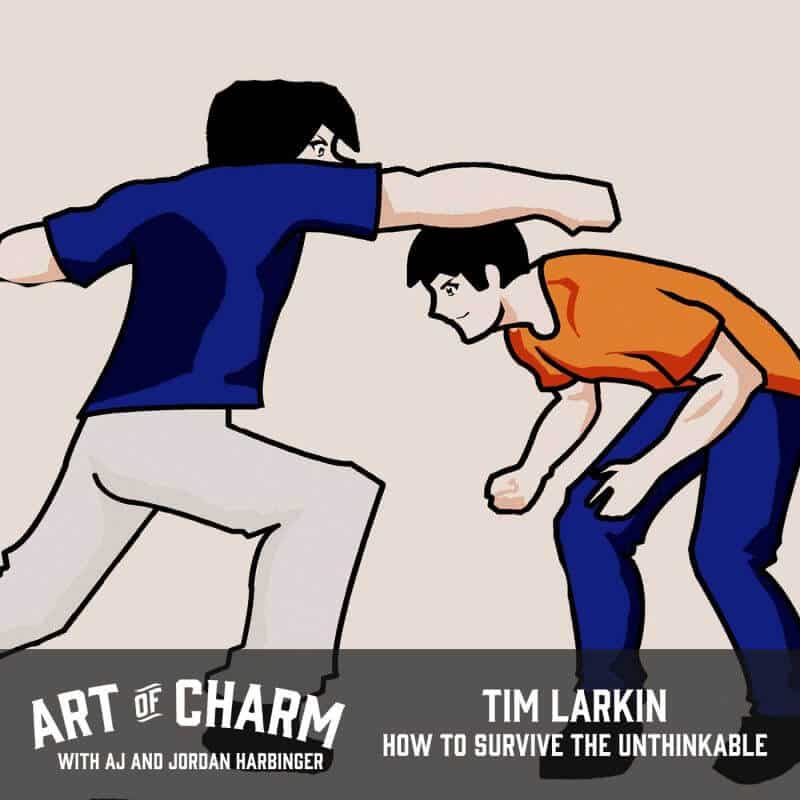Violence is simply a tool.
“The best information for survival is going to come from the worst part of society.” -Tim Larkin
The Cheat Sheet:
- Why has Tim been banned from the UK?
- What advice did Tony Robbins give him after going through his training?
- Why women’s and men’s perception of violent situations are so different.
- Why banning weapons does little to stop physical attacks.
- What did his South Boston grandpa teach him about violence?
- And so much more…
If you were ever in a situation where your life and other lives were in physical jeopardy, would you know how to respond? Our guest for today’s show believes you should sink to the level of your training, not rise to the occasion of violence. So unless you know how to use violence as a tool, you won’t stand a chance.
Here to talk about the evidence behind his stance and his book, Survive the Unthinkable: A Total Guide to Women’s Self Protection, is Tim Larkin. Join us as we chat about this and more on episode 380 of The Art of Charm.
More About This Show:
Tim Larkin has spent 20 years educating others and understanding the role violence plays in various cultures. He has witnessed violence crossing all demographics, and acknowledges anyone can be on the receiving end.
But what can set us apart and help us to survive the unthinkable is to use violence as a tool. In fact, his company motto is: Violence is rarely the answer. But when it’s the answer, it’s the only answer. And what he means by this is not to indiscriminately use violence in any scenario, but to know when violence is necessary and to use it accordingly.
Violence is a tool and a tool we have used to survive since humans first walked the planet. We used it to fend off attacks from animals and to protect ourselves, and we did it very well because we’re still here today.
Tim goes on to say criminals will use violence as a tool to get what they want, and we have to do the same to protect ourselves just like our ancestors did. With his training and in his book Survive The Unthinkable, he makes certain we understand what scenarios we don’t have to respond to with violence, and he also explains how to survive when we do have to use violence. In essence, he helps us think like violent offenders without becoming them.
The best tactics and the best information we can find are going to come from the worst part of the society: the violent offenders. These people see violence as a currency, a way to get results. What’s incredibly fascinating is how most of us see violent attacks as good or bad.
For example, if a woman is attacked and defends herself by stabbing her attacker in the neck, we applaud her and press no charges against her in court: she was, after all, just defending herself. Now if we reverse the situation and the attacker goes after the same woman and stabs her and kills her, we want him thrown in jail for life (at minimum — perhaps even seeking the death penalty if that’s an option).
Tim encourages us to look at the situation differently: what was successful in this attack and how can you use that knowledge? Odds are high that if the woman was able to stab and kill her attacker, she struck first. And vice versa.
He gives several more examples like this one on this show. We also talk about why MMA and UFC fight moves won’t help you, a simple approach to communicating that disarms and diffuses most aggressors, and much more. Massive thanks to Tim for his valuable insights on this episode. Thank you for listening and we’ll see you next time on The Art of Charm.
THANKS, TIM LARKIN!
Resources from this episode:
- Tim Larkin’s website
- Survive the Unthinkable: A Total Guide to Women’s Self Protection by Tim Larkin
You’ll also like:
- The Art of Charm Bootcamps
- Best of The Art of Charm Podcast
- The Art of Charm Toolbox
- The Art of Charm Toolbox for Women
On your phone? Click here to write us a well-deserved iTunes review and help us outrank the riffraff!




